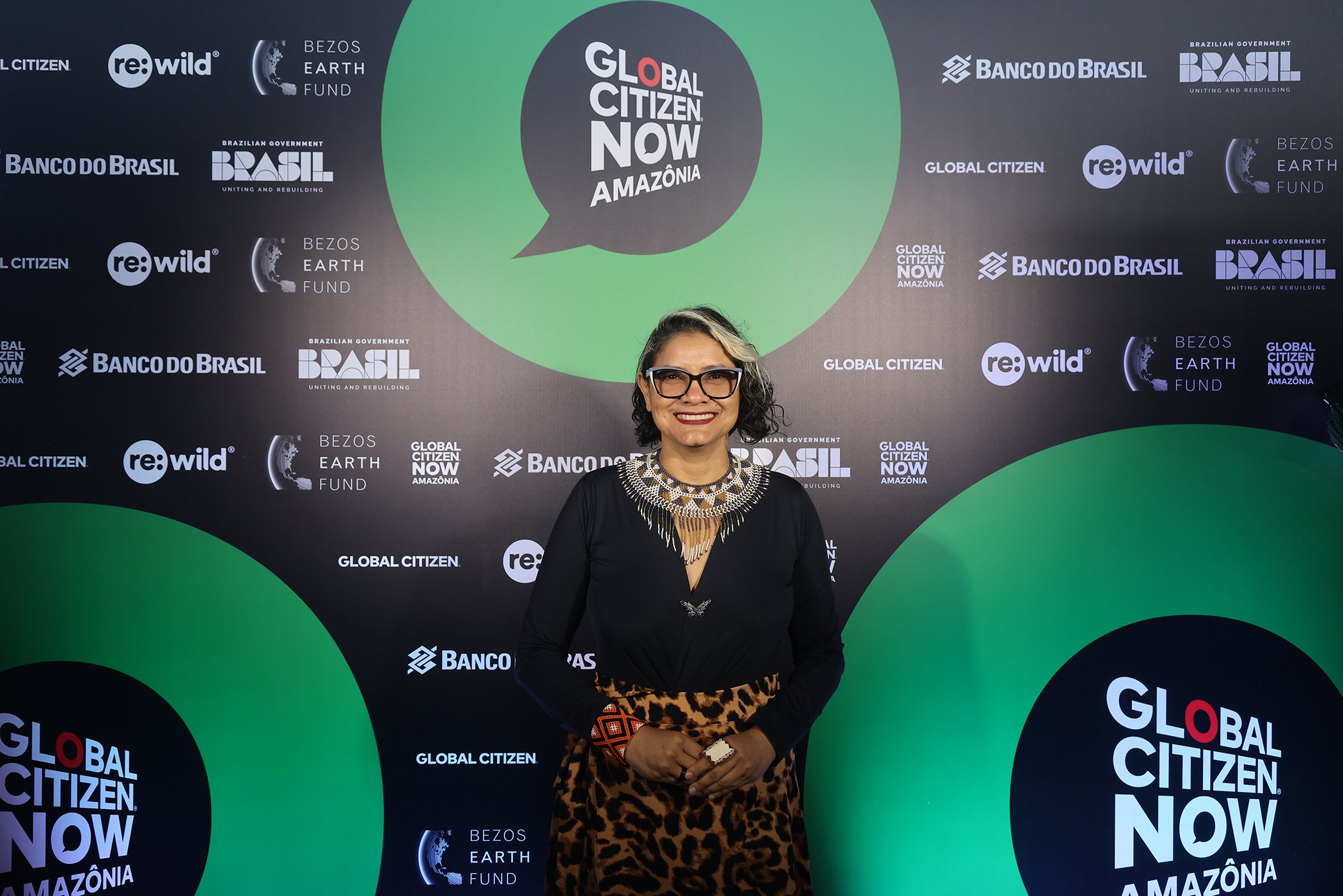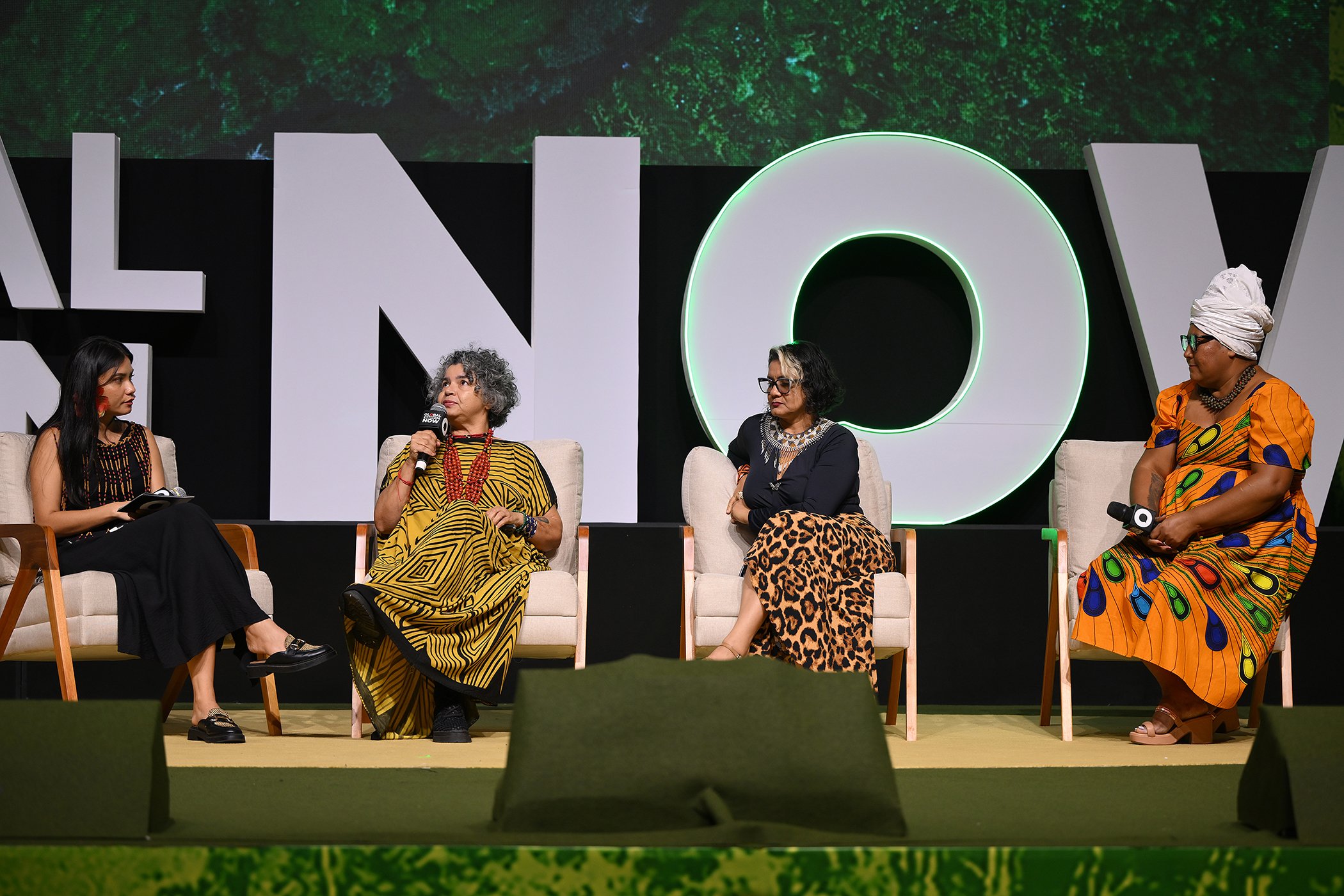Claudelice Santos is a human rights and environmental defender from Pará in Brazil. Her organisation Zé Claudio e Maria Institute, named after her brother and sister-in-law, is a socio-environmental justice organisation thatprovides support and assistance for activists in danger.
Here Claudelice shares how her family has survived in the Amazon rainforest and how she now defends it and the people that rely on it for their livelihoods.
My name is Claudelice Santos
I'm from Pará, with deep roots in the Amazon. I live in the southeastern region of the state, with my roots grounded in this territory. I grew up in Marabá, but I also lived in Nova Ipixuna, a neighboring municipality. But currently, for security reasons, I no longer live there.
My childhood was a constant transition between two worlds. In the rural area, where my family owned land and lived alongside the forest, the distance was great, and access was difficult. Getting around required long boat trips or hours of walking. As children, we sometimes used animals, like donkeys, for transportation.
For school, we spent more time in Marabá, in the Morada Nova neighborhood because the rural area had no roads or schools. The children, therefore, couldn't stay long in the fields, but we returned there frequently. Thus, my life was divided between the city and the countryside.
 Claudelice Santos, Environmental and Human Rights Activist of Instituto Ze Claudio e Maria poses during Global Citizen NOW: Amazonia at Estação das Docas on July 24, 2025 in Belem, Brazil.
Claudelice Santos, Environmental and Human Rights Activist of Instituto Ze Claudio e Maria poses during Global Citizen NOW: Amazonia at Estação das Docas on July 24, 2025 in Belem, Brazil.
My family has always been involved in this productive and sustainable forest.
Nowadays, we talk about the bioeconomy, but for us, the forest has always been our pharmacy, our kitchen, our pantry, from where we find meaning in our existence.
During adolescence and adulthood, conditions improved. The arrival of roads facilitated access to the region, the reserve, the rural area, and the activists' territory. This transformation was the result of much struggle by local communities, made up of coconut breakers, forest dwellers, and traditional communities.
My family has always lived off small-scale family farming, but mainly from collecting forest fruits. The Pará forest fruit is the main product, and my family still collects and sells it today, ensuring our livelihood. Other fruits, such as andiroba, are also important. The women in my family extract andiroba oil, and there is a women's group that, since 2006, under my late sister-in-law, Maria's leadership, aimed to and continues to strengthen andiroba oil production.
My great-grandmother was an Indigenous woman of the Gavião ethnic group, and my ancestry extends to the Kayapó people...
…actually, my great-grandfather was Kayapó. They met in a violent situation. She was "pegada de cachorro” (someone who was forced to go with another person). My great-grandmother was kidnapped, enslaved, and raped. My great-grandfather, who built and sold boats on the Tocantins River, found her. Together, they fled. He prepared a larger boat, filled it with food, and one day, stopped at the port so she could escape the man who was enslaving her. From this encounter, my grandmother, my mother, and I were born. This story is told in our family so that we never forget our origins, our roots, and, above all, to honor our history.
It's very difficult to put human rights and democracy in the same sentence when you're in a territory where democracy doesn't exist and violence is the order of the day.
My childhood was marked by laughter, bathing in the Tocantins River, and eating fruit straight from the tree such as mangoes, bananas, oranges, cashews, and many other fruits of the forest. Bacuri and uxí were my favorites. It was a happy childhood, grounded in family principles. I was never ashamed of being the daughter of farmers, chestnut gatherers, and country folk. Growing up in the city, we realized there was still a certain stigma attached to people from rural areas. However, we were never ashamed. When I enrolled at the Marabá Agricultural Family School (EFA), this identity strengthened even further.
I didn't become an activist. I was born into this context.
Zé Claudio was my older brother, the man who was the pillar of the family and the community, and wife Maria was synonymous with strength, generosity, and boldness. She was the person who inspired me, who inspired me to understand that only through knowledge could we overcome various barriers. And so, I created the women's group that still exists in my community today, even after so much violence.
Without a doubt, the murder of José Claudio and Maria was a turning point in my life. It was the turning point between me receiving a violent shock in my life and realizing that the threat is not just here in the region; it's a much larger structure of death, violence, and narratives that disqualify, diminish, and make traditional peoples and communities vulnerable.
We have an organization named after Zé Claudio and Maria.
The main objective of this work, this organization, is socio-environmental justice. We primarily help protect defenders who are under threat.
We understand that the current format of the protection program — in which the state provides for threatened defenders, the same failed protection program they provided to Zé Claudio — is completely neglected, invisible, and vulnerable. So, considering our hard experience, we carry this banner of protection and care, the protection of those who defend territories.
In a network with other organizations, we monitor not only the public policy of care and protection in Pará, but also the national policy, and we also create our own protection and care protocols.
We have experience providing care and protection for defenders who truly need psychosocial and legal attention, especially when displacement is a serious threat. We have a place called the Forest Breathing House, where defenders can seek refuge if necessary.
The Brazilian government never, ever, ever moved at any level to provide care and protection for Zé and Maria.
The way they wanted to provide protection for Zé and Maria at the time was to remove them from the territory and take them elsewhere, and change their names. But they weren't the criminals.
The failure wasn't just in protection, it was in all the processes of mitigating violence, as well as observing, analyzing, and investigating complaints. Therefore, the Zé Claudio e Maria Institute's main objective is to look primarily at the care and protection that defenders in threatened situations need, but also understand that it is the state's duty to investigate, mitigate, and provide the necessary protection for defenders in need.
All the defenders who seek us out are human rights defenders linked to land, forest, and water, and they all face threats from some form of capital, often [and allegedly] through large enterprises where it turns out that the Brazilian state itself is the threat. Whether from companies authorized by the state to exploit or ultimately provoke some kind of violence, or access to information about these enterprises or investments in territories.
It's very difficult to put human rights and democracy in the same sentence when you're in a territory where democracy doesn't exist and violence is the order of the day.
 Priscila Tapajowara, President Midia Indigena, Angela Mendes, President of the Chico Mendes Committee, Claudelice Santos, Environmental and Human Rights Activist of Instituto Ze Claudio e Maria and Vanuza do Abacatal, Political Leader, Human Rights advocate e Coordinator of Racial Equality Policies in Ananideua attend the Global Citizen NOW: Amazonia on July 24, 2025 in Belem, Brazil.
Priscila Tapajowara, President Midia Indigena, Angela Mendes, President of the Chico Mendes Committee, Claudelice Santos, Environmental and Human Rights Activist of Instituto Ze Claudio e Maria and Vanuza do Abacatal, Political Leader, Human Rights advocate e Coordinator of Racial Equality Policies in Ananideua attend the Global Citizen NOW: Amazonia on July 24, 2025 in Belem, Brazil.
But we fight with the weapons we have, and unfortunately, we suffer.
We try within our means and our expertise to do what is necessary to minimize,mitigate, or reduce this violence.
I've received several death threats, especially after Zé and Maria were murdered. There's no fight for land, forest, or water without these negative reactions. They portray us as enemies of the state, they portray us as enemies of development, they love distant nature, they love defenders of nature only for their little bites on the internet.
But when it comes to real action, it's the bodies of those who live in the places that need to be protected that suffer.We see a lot of online activism, but in real activism, people continue to die, to be violated, to be criminalized. So, my dream is that one day people will understand the importance of forest defenders to this planet and will treat them with the respect that they truly deserve.
I wanted to be a forestry engineer to help my community.
After the murder of my brother and sister-in-law, I thirst for justice: social justice and socio-environmental justice. My desire to impact this planet is to ensure that all people have socio-environmental justice. So that we have food, but also so that we don't die from the hot sun because people are destroying the planet. This is one of my main aspirations as a human rights and environmental defender.
But you have to have the courage to "drink milk from a tiger", [perform the impossible] you know? Because it's not easy. There are two barriers, two challenges. The first is the state itself, which runs over this dream like a bulldozer, as if supported by big capital, large and small companies that include agribusiness.
So, it's not only challenging, it's dangerous. You have to have courage, right? The second barrier — that is still provoked by the first, yet is embraced by part of society — is the view of defenders as enemies of the state, or as enemies of progress. This first group, which consists of banks, companies, and the state itself, creates narratives to demoralize, declassify, and portray them as land invaders, enemies of progress, troublemakers, bandits, vagabonds — though the truth is that they just want to live in peace in their forests, in their territories.
I am from a city where misinformation is often used to undermine, discredit, and criminalize individuals.
This particularly affects those of us who advocate for forest conservation and human rights. The obstacles we face are considerable, making it challenging to work without constraints. For instance, heightened security measures are installed at my residence, within the reserve, and at our office to address these challenges.
At one point, they even tried to set fire to a defender's house. Clearly, we don't work freely, we can’t express ourselves freely, but we have to be bold, as Maria used to say. And when I remember Maria's quote, that we have to be bold in the fight, I remember a quote from Zé. He said: “it's better to die fighting than to die from inaction.” So defenders won't stop. We won't stop because we are much bigger than them. It's for our future. It's for us to have a healthy planet. The challenges are enormous, but the people's courage to live and protect the forest is even greater.
Watch Claudelice Santos At Global Citizen NOW Amazonia
This article, as narrated to Vanessa Gabriel, has been slightly edited for clarity.
The 2025-2026 In My Own Words series is part of Global Citizen’s grant-funded content.